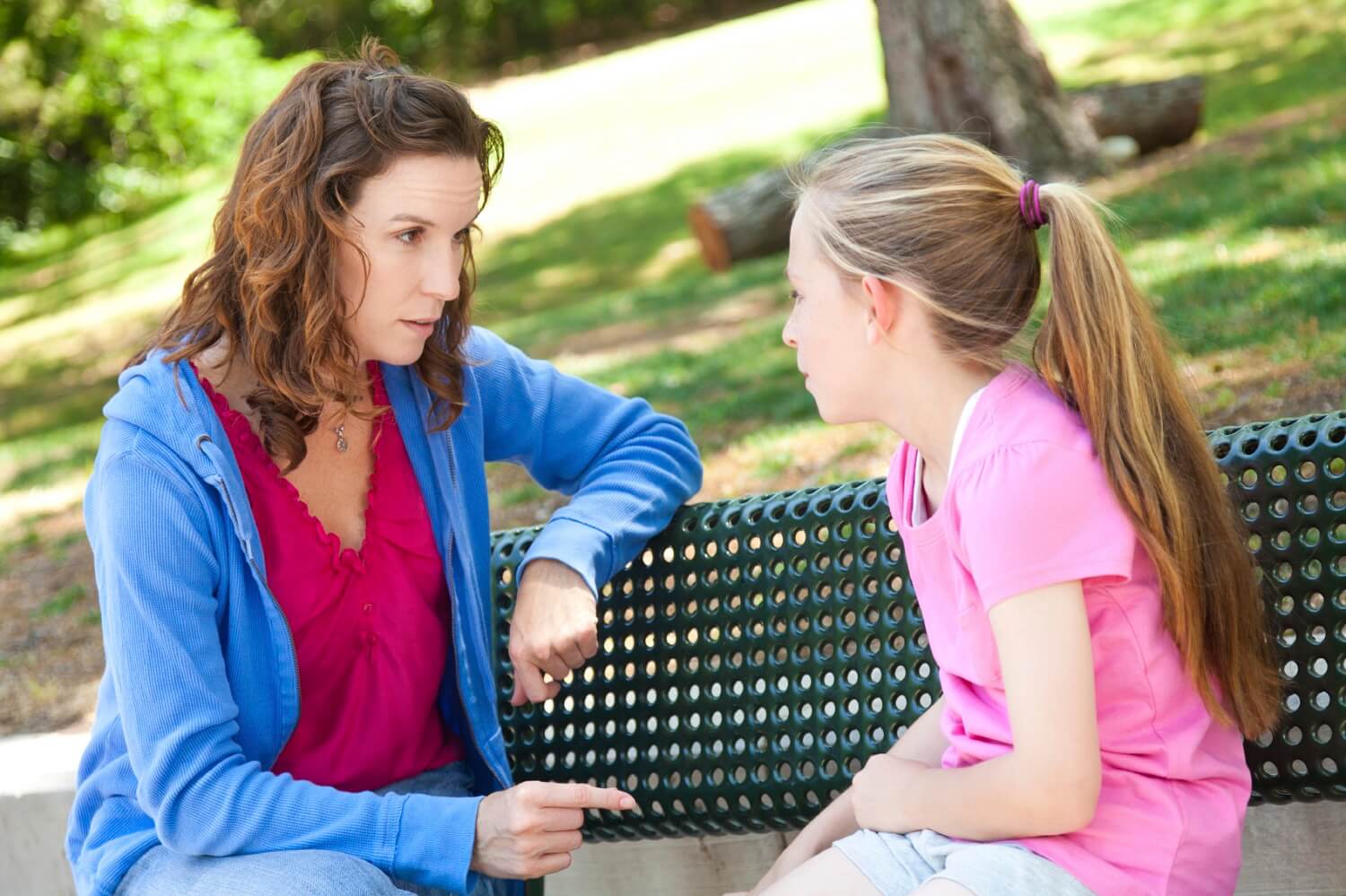How to Talk to Your Children about Strangers

Talking to your children about strangers isn’t always an easy task, but it’s absolutely necessary that they understand the difference between being polite to others and being safe. Not everyone is what they seem to be, nor does everyone show who they really are.
It’s very important that every parent around the globe takes the time to have this kind of conversation with their children. In doing so, they will be helping to save their children’s lives in possible future circumstances.
There are four words that many parents have grown up hearing over and over again: “Don’t talk to strangers!” Unfortunately, there have been incidents of children being kidnapped and this terrorizes fathers and mothers all over the world.
Children tend to talk to just about anyone. While it’s great that they are friendly, we need to be careful with this tendency to be so open with anyone and everyone. We need to teach our children the balance between being friendly and discovering danger in order to protect themselves.
Choose your words carefully
Experts say it is best not to use the word “stranger” when talking to your children about this issue. There are adults of all kinds (family members, people your children know, and actual strangers) that may try to deceive children in order to carry out their horrible plans. Therefore, it is important that children know that it’s not only strangers that they should distrust in certain circumstances.

This wicked type of person doesn’t frighten children at the beginning because they start out being friendly and unusually charming. It’s very easy to kidnap a child with a simple toy or a piece of candy.
In order to be sure that your child knows what to do, you should ask your children questions like: What happens if an adult offers you candy or toys? What happens if a man asks you for help finding his lost dog?
Education is your best friend. An educated person is respected everywhere. Education beats the beauty and the youth.
-Chanakya-
Your child should understand that he can only talk to strangers when he is with his mom or dad, or with another adult that he really trusts. Also, if this adult in whom he truly trusts behaves in a strange way, your child should immediately tell mom or dad.
If your child asks why she can’t accept a piece of candy or a toy, or why she can0t help someone find their lost dog, don’t say something like “because you might get kidnapped.” It’s better to respond with something like, “Although most people are good, there are some people that are not, and it’s best to be safe just in case.”
Furthermore, it’s essential that your children understand that they cannot go anywhere without your permission or consent.
Plan ahead
Role playing games are a discreet and fun way to help your child learn what to say or do in a potentially unsafe situation.
You will need to keep in mind that, on some occasions, children should look for an adult to ask for help. Therefore, it’s important to go over the different scenarios that can take place.
Tell your child, for example, that if he is lost in a public place, then he will have to speak with some store employee or talk to another mother with children.

Teach your children to trust their instincts
It’s important to teach your children to trust their own instincts when it comes to any person, not only with strangers. The majority of abuse cases occur with adults that the child already knows, so it is tremendously important that your child know how to differentiate between what is okay and what is not.
You can tell your child things like: If you start to feel strange, or your stomach starts to hurt, you should listen to what your instincts are telling you. Stay away if someone makes you feel uncomfortable, and go right away to tell an adult you can trust.
It’s a good idea to have a list of rules on the refrigerator door so that your children can see them and learn them. This list should include rules such as: “In this family, we don’t keep secrets. If someone tells you to keep a secret, you should tell mom or dad right away.”
Talking to your children about strangers isn’t always an easy task, but it’s absolutely necessary that they understand the difference between being polite to others and being safe. Not everyone is what they seem to be, nor does everyone show who they really are.
It’s very important that every parent around the globe takes the time to have this kind of conversation with their children. In doing so, they will be helping to save their children’s lives in possible future circumstances.
There are four words that many parents have grown up hearing over and over again: “Don’t talk to strangers!” Unfortunately, there have been incidents of children being kidnapped and this terrorizes fathers and mothers all over the world.
Children tend to talk to just about anyone. While it’s great that they are friendly, we need to be careful with this tendency to be so open with anyone and everyone. We need to teach our children the balance between being friendly and discovering danger in order to protect themselves.
Choose your words carefully
Experts say it is best not to use the word “stranger” when talking to your children about this issue. There are adults of all kinds (family members, people your children know, and actual strangers) that may try to deceive children in order to carry out their horrible plans. Therefore, it is important that children know that it’s not only strangers that they should distrust in certain circumstances.

This wicked type of person doesn’t frighten children at the beginning because they start out being friendly and unusually charming. It’s very easy to kidnap a child with a simple toy or a piece of candy.
In order to be sure that your child knows what to do, you should ask your children questions like: What happens if an adult offers you candy or toys? What happens if a man asks you for help finding his lost dog?
Education is your best friend. An educated person is respected everywhere. Education beats the beauty and the youth.
-Chanakya-
Your child should understand that he can only talk to strangers when he is with his mom or dad, or with another adult that he really trusts. Also, if this adult in whom he truly trusts behaves in a strange way, your child should immediately tell mom or dad.
If your child asks why she can’t accept a piece of candy or a toy, or why she can0t help someone find their lost dog, don’t say something like “because you might get kidnapped.” It’s better to respond with something like, “Although most people are good, there are some people that are not, and it’s best to be safe just in case.”
Furthermore, it’s essential that your children understand that they cannot go anywhere without your permission or consent.
Plan ahead
Role playing games are a discreet and fun way to help your child learn what to say or do in a potentially unsafe situation.
You will need to keep in mind that, on some occasions, children should look for an adult to ask for help. Therefore, it’s important to go over the different scenarios that can take place.
Tell your child, for example, that if he is lost in a public place, then he will have to speak with some store employee or talk to another mother with children.

Teach your children to trust their instincts
It’s important to teach your children to trust their own instincts when it comes to any person, not only with strangers. The majority of abuse cases occur with adults that the child already knows, so it is tremendously important that your child know how to differentiate between what is okay and what is not.
You can tell your child things like: If you start to feel strange, or your stomach starts to hurt, you should listen to what your instincts are telling you. Stay away if someone makes you feel uncomfortable, and go right away to tell an adult you can trust.
It’s a good idea to have a list of rules on the refrigerator door so that your children can see them and learn them. This list should include rules such as: “In this family, we don’t keep secrets. If someone tells you to keep a secret, you should tell mom or dad right away.”
All cited sources were thoroughly reviewed by our team to ensure their quality, reliability, currency, and validity. The bibliography of this article was considered reliable and of academic or scientific accuracy.
- KidsHealth staff. (n.d.). How can I teach kids to be smart about strangers? KidsHealth. https://kidshealth.org/en/parents/stranger-smarts.html
This text is provided for informational purposes only and does not replace consultation with a professional. If in doubt, consult your specialist.








